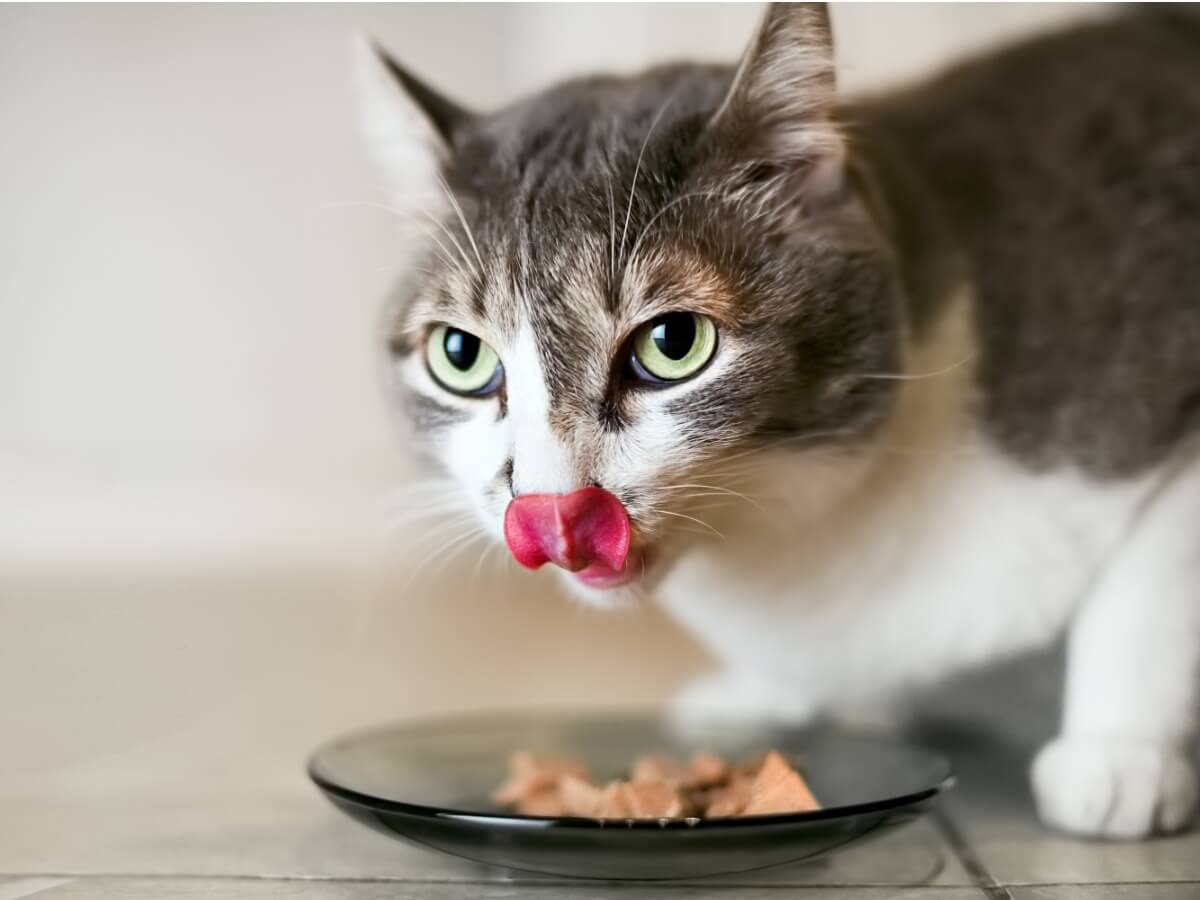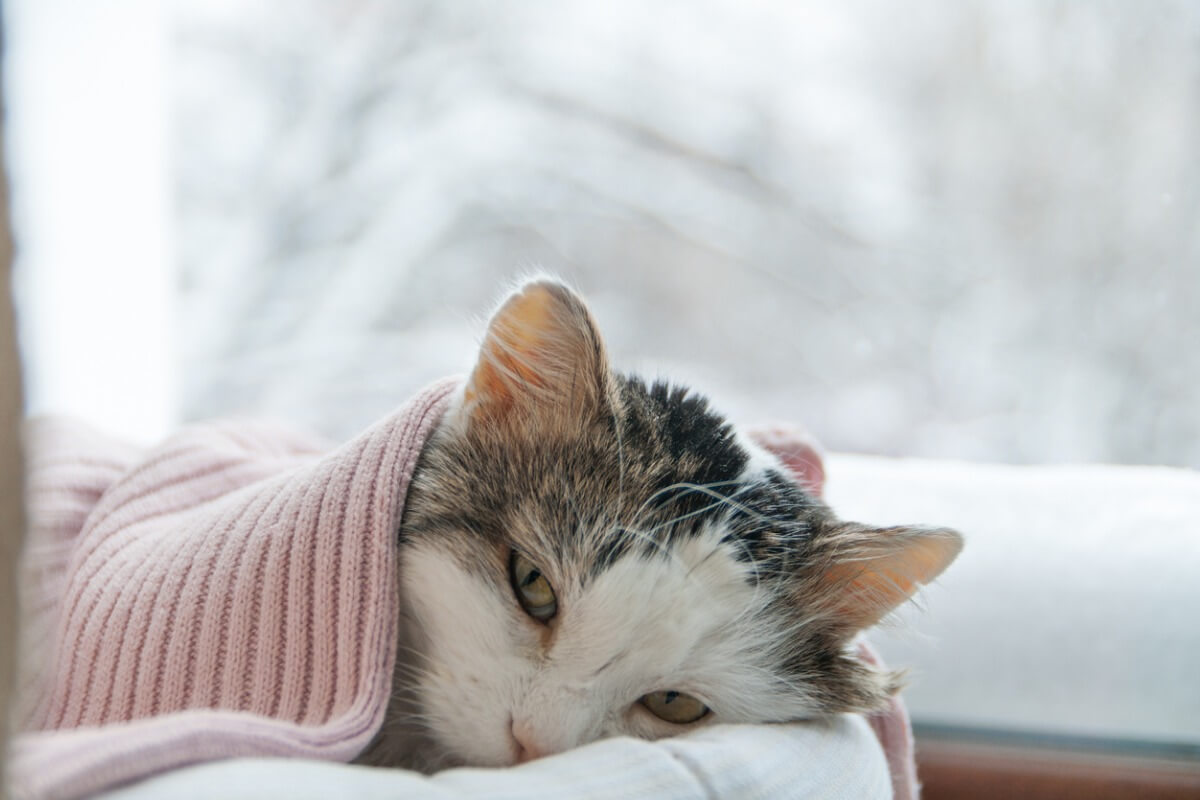Inflammatory Bowel Disease in Cats: Symptoms and Treatment

Inflammatory bowel disease in cats represents the leading cause of digestive problems in domestic felines. It isn’t so much a disease in itself as a set of idiopathic conditions, that is, a series of medical events whose occurrence has no defined cause.
That’s why this disease requires an accurate diagnosis and the attention of the owners, because letting the symptoms pass can lead to chronic conditions and compromise the life of the feline. In this article, you have all the basic information you need to know what signs you shouldn’t ignore. Don’t miss it.
What’s inflammatory bowel disease in cats?
Inflammatory bowel disease in cats or IBD is a disorder characterized by persistent digestive symptoms accompanied by inflammation of the gastrointestinal tract. This occurs because inflammatory cells accumulate in the affected area, either lymphocytes, macrophages, or eosinophils.
It’s a disease with periods of worsening and improvement. In addition, this inflammation of the gastrointestinal tract will affect the animal’s ability to absorb nutrients. If it’s allowed to progress, nutritional deficits will appear sooner or later.
It most commonly affects middle-aged cats (from about 6-7 years old), although it can be found in younger specimens too.

Causes of the disease
The causes haven’t yet been clearly defined, even with all the research that has been carried out on this condition in cats. It’s thought to be an abnormal interaction between the immune system and the intestinal flora. It can also become chronic from internal parasite infestations, bacterial infections, and poor diet.
Genetic predisposition
There’s no gender difference in the incidence of IBD, with both males and females suffering equally. Although it appears to be more common in Siamese, Persian, and Himalayan cats, there’s no conclusive evidence linking IBD to particular breeds.
Symptoms of inflammatory bowel disease in cats
Recognizing the symptoms is essential to get to a vet as soon as possible, but for owners caring for cats that go outdoors a lot or live in colonies, IBD can be very difficult to spot. Keep an eye out for the following signs:
- Anorexia or loss of appetite. Some cats, on the other hand, may eat more than normal (known as polyphagia).
- Weight loss.
- Mucous or bilious vomiting: this is the most common sign in cats.
- Recurrent diarrhea: if the large intestine is affected you may find blood in the stools.
- Enlarged mesenteric lymph nodes.
- Lethargy.
Depending on what symptoms your cat is showing, you can guess – but not diagnose – the area in the gastrointestinal tract where the inflammation is occurring. While vomiting and weight loss are indicative of inflammation in the upper part of the gastrointestinal tract, the lower part of the tract shows signs such as diarrhea with blood and mucus.
Diagnosis of inflammatory bowel disease in cats
As you’ve seen above, the symptoms are quite non-specific and could be indicative of other disorders. Diagnosis, therefore, is usually made by ruling out other pathologies through various tests:
- Blood tests: A biochemical test is performed and T4 (thyroid hormone, the increase of which could explain the weight loss due to hyperthyroidism) is measured. If vitamin B12 is below optimal levels, the problem may be in the last part of the small intestine (the ileum).
- Urinalysis. This test will rule out diseases with similar symptoms, such as diabetes.
- Abdominal X-ray: This test checks the condition of the stomach, kidneys, and liver. It can also see possible foreign bodies lodged in the digestive tract.
- Abdominal ultrasound. This allows the thickening of the intestinal wall to be seen and measured.
- Biopsy of the intestinal wall: This is carried out by laparoscopy or endoscopy. This test can be used to differentiate inflammatory bowel disease from intestinal lymphoma.
Treatment of inflammatory bowel disease in cats
Once the disease has been correctly diagnosed, personalized treatment is decided for the cat. In addition, if concomitant diseases have been found, they’ll also be treated in an ancillary way.
Treatment of IBD combines drugs that modulate the immune system with a specific diet. These 2 aspects are explained in more detail below.
Medical treatment
Inflammatory bowel disease in cats requires a combination of medications carefully measured by the veterinarian. The most common are as follows:
- Vitamin B12 supplementation: If the animal is deficient in this vitamin, it should be given subcutaneously. The frequency of doses is reduced to a monthly intake so that the body doesn’t develop dependence and can regulate itself.
- Metronidazole: This is an antibacterial and antiparasitic drug that also has an immunomodulatory effect. It’s very important to follow the dosage schedule given to you by your vet, otherwise, it can cause adverse effects in your cat.
- Corticosteroids: Prednisolone is usually the most prescribed medication in this group. Corticosteroids are immunosuppressants, so they’ll help to reduce the inflammatory response.
- Immunosuppressants: If the rest of the drug therapy isn’t sufficient to modulate the animal’s immune response, other drugs can be added to modulate the immune response, such as chlorambucil or cyclosporines.
Dietary treatment
A vet should establish a hypoallergenic diet for the cat. This is because, as with food intolerances and allergies, the cat may not be able to absorb the nutrients from the food it normally eats. Therefore, it’ll be offered new ingredients – that it has never eaten – and hydrolyzed feed, which promotes the absorption of nutrients.
Achieving greater intestinal absorption is also a way to reduce the likelihood of infections, as bacteria are left without substrate to proliferate.
To help the cat’s intestinal flora to recover, you can provide an extra supply of fiber in the diet or use probiotics. There’s also a wide range of commercial products suitable for cats with intestinal problems. Consult your vet about their use if in doubt.

An illness that shouldn’t be overlooked
Inflammatory bowel disease in cats can have serious consequences on the animal’s health if you don’t treat it. In addition to this, there are so many illnesses and conditions that have the same symptoms, and you won’t be able to figure out which one of them it is by simply observing the symptoms in your pet.
Therefore, whenever you observe recurrent diarrhea or vomiting and that occur from time to time, go to the vet. Early diagnosis will be the best guarantee to have the disease under control and to be able to give your cat a good quality of life.
All cited sources were thoroughly reviewed by our team to ensure their quality, reliability, currency, and validity. The bibliography of this article was considered reliable and of academic or scientific accuracy.
- ZENTEK, J., & Freiche, V. (2006). Patologías digestivas en el gato: papel de la nutrición. Biourge V.; Elliott, D. Enciclopedia de la nutrición clínica felina. Royal Canin, 77-137.
- Gómez-Rodulfo, J. M., Ortega, J. G., & Laparra, M. B. M. Utilidad de la endoscopia digestiva en el diagnóstico de la enfermedad inflamatoria intestinal (EII/IBD).
- Arce Rosamén, C., & Pereyra Machado, F. B. (2012). Enfermedad inflamatoria intestinal: presentación de un caso.
- Navarro, E. P., Fabián, M. D. C. A., & Gómez, O. S. Linfoma Intestinal: un estudio comparativo entre perros y gatos.
This text is provided for informational purposes only and does not replace consultation with a professional. If in doubt, consult your specialist.